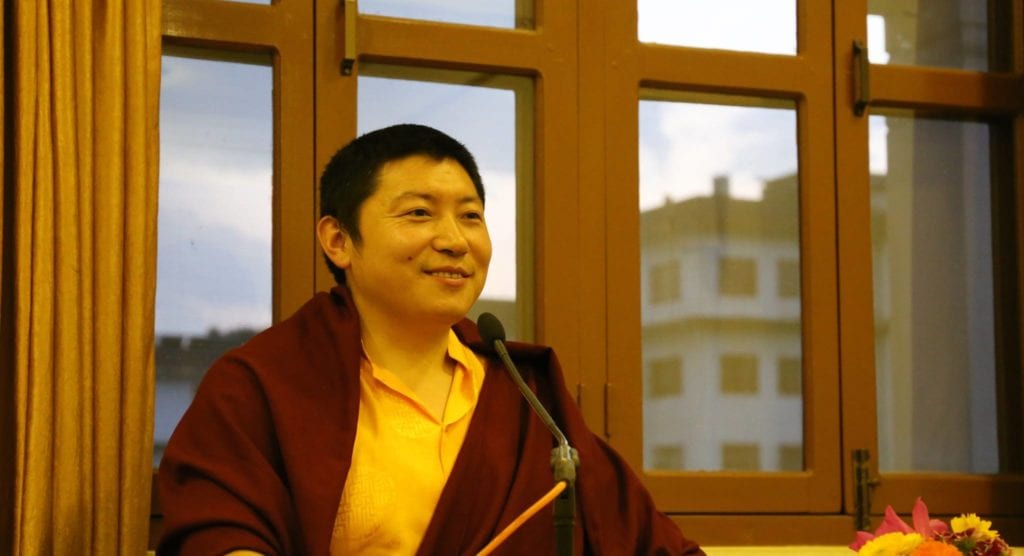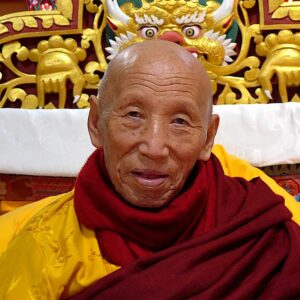Reassuring Family and Friends
Many of us may have made a commitment to Buddhism after growing up in another or no faith tradition. If we have entered the Buddhist path, we may not know how to explain our new path to friends and family. How do we skillfully share our understanding and our practice? Phakchok Rinpoche here shares some suggestions after years of working with students from many cultures.
Many family members or friends may fear that we will reject them or we will become nasty. We have to understand that others fear we will change our behavior toward them and that we will become “bad” people. And this makes sense. Although people worry about “cults,” everybody shares the desire to belong to something. So we need to carefully examine the Buddha’s teaching. Does any of the Dharma teach us to adopt bad behavior? We can start right there with our family and friends by explaining that simple fact.
Explaining Ritual and Dress
Family and friends may have questions about new rituals we observe or new clothing. But ritual and special dress don’t have to be such big deals. All cultures use special costumes for certain events: think about Halloween, for example! During Halloween, we make fun of evil, right? Similarly, all cultures have formal occasions where we have to wear three piece suits or other formal attire depending on the tradition. If we show up to one of these events dressed in ordinary casual attire, they won’t allow us to enter. Why do we go along with this, Rinpoche asks? Because we are dressing to “belong.” So when we examine, we need to understand that clothing has many functions. It can illustrate hierarchy or level in society or it can show rank in a branch of service like the military. It signals belonging to a specific group.
On the other hand, in Buddhist teaching, dress reminds us of our vows. If we adopt Buddhist robes or dress to remove ourselves from the world, this is an incorrect understanding. Because we should always be remembering the mind of awakening, or bodhicitta. We should always be thinking of compassion. Thus we are always engaging in worldly activities. We may not be physically or financially engaging, but our minds are always engaging by praying for others and wishing them well. This does not mean that we are trying to convert everyone to Buddhism – we support their free choice. At the same time, if we can carry a mala or wear robes, then that’s okay. We shouldn’t worry about explaining our dress to others.
Behavior and Ethics
Instead, we should focus on our behavior. We can demonstrate our Buddhist beliefs by behaving nicely and normally. If our friends and family ask questions, we can try to answer politely and respectfully. And if they seem really open and interested, we can explain that our dress helps us maintain mindfulness. We can talk about how we use a mala to remind us to pray. One way to explain this is to compare it to a wedding ring. In many cultures, a wedding ring (or another physical symbol) reminds us of our commitment to our partner. Similarly, for a Buddhist practitioner, a mala reminds us of our commitment to bodhicitta, compassion, meditation, and dignity.
Relating to Ritual
We also should understand that all cultures have rituals. Often, students worry about ritual because they think it is only part of Tibetan Buddhist culture. But if we honestly examine our lives, we have so many rituals in our mundane life. We go to parties where we know we should bring a bottle of wine or a bouquet of flowers to the hostess or host. Valentine’s Day has become so popular all over the world and we all participate by buying candy, flowers, or cards for loved ones and friends. New Year’s parties and weddings also have all sorts of customs that we accept without many questions. And Rinpoche says that in some cases, this ritual can just be an expression. Ritual often has many meanings and traditionally, Buddhist ritual can aid us in remembering our practice. Some people will connect very easily with it, and others may hate it at the beginning. But it has a purpose!










Responses